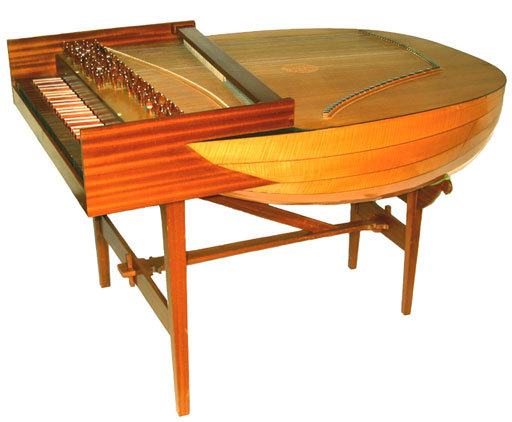mp3 Demo - Johann Sebastian Bach - Fuge BWV 1000 g für Lautenwerck
mp3 Demo - Georg Böhm - Präludium - Fuge - Postludium g
mp3 Demo - D'Anglebert - 2ème Gigue
Performed by Steffen Fahl
mp3 Demo - Praeludium I - Johann Sebastian Bach
mp3 Demo - Praeludium III - Johann Sebastian Bach
mp3 Demo - Aria - Dietrich Buxtehude
mp3 Demo - Bassa Imperiale - Regina Clara
mp3 Demo - Wenn ich so denk - Anonym
Performed by Tobias Birkenbeil
The performances contain additional reverb.
The German Lautenwerck library brings a long-gone instrument into your sampler: The Lautenwerck - or Lute-Harpsichord - was one of Johann Sebastian Bach's favourite instruments.
Despite 50 Lautenwerck builders in Germany, not a single instrument survived throughout the centuries. When the instruments had vanished, the awareness had gone, too: Only few decades ago, musicologists rediscovered the instrument's existence, solving the mystery of scores written specifically for Lautenwerck. Until then, the usual idea was that a composer had meant a regular lute instrument by providing such remarks. After the knowledge had resurfaced, Professor Beurmann had a reconstruction built by Ludwig Richter in Ludwigsburg, Germany.

The oval Lautenwerck body resembles the look of a lute as well - photo by Andreas E. Beurmann
Back in the days of harpsichords and spinets, the lute-harpsichord offered a much warmer, soft and intimate yet defined tone. While having been built to imitate a lute on a keyboard instrument in the first place, it brings a consistent attack to the table (due to not being touch-sensitive, like a harpsichord) and also by allowing for full decay of all notes due to missing dampers. This allows for a vibrating, reverberant yet still transparent sound.
Just like harpsichords and spinets, the Lautenwerck is not touch-sensitive. However, not any given note will sound exactly the same due to different resonances of body and strings. In order to pay tribute to the instruments' variation, every note was captured with 8 different samples. The key release sounds are also of major importance for the overall experience. Therefore, we recorded 4 release samples per note.
The instrument is now available for your sampler, presented in its original Valotti tuning at 412 Hz (presets at 440 Hz are available as well). Furthermore, the library contains an essay in German by Dr. Andreas Beurmann, explaining the background of the instrument.
The sample library contains nearly 700 single recordings.
Presets are included for HAlion®, Kontakt® (full version required) and EXS24® software samplers.
Recorded in the great sounding rooms of the Hasselburg estate, we employed vintage Neumann™ TLM170® microphones in conjunction with Crane Song™ Flamingo® preamps and Universal Audio™ 2192® digital converters. We recorded the instrument at 192 kHz/24 bits, downsampled to your resolution of choice.
Brand names, trademarks and product names belong to their respective owners.










